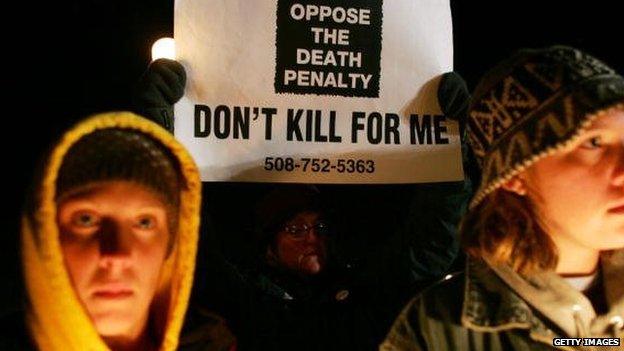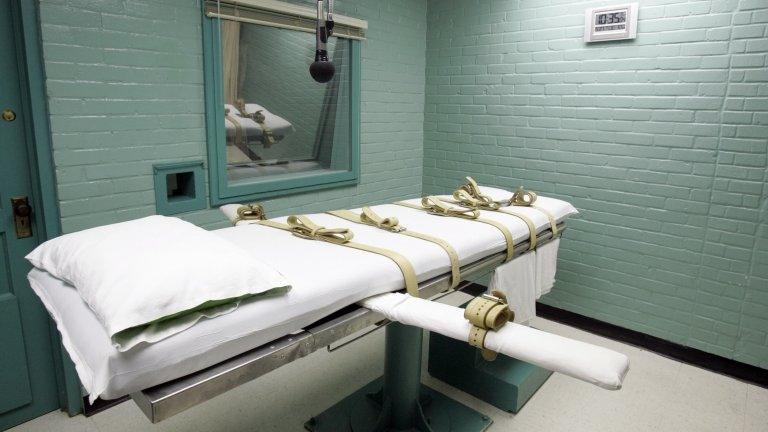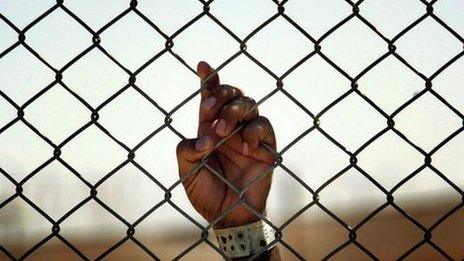Is capital punishment 'machinery of death' grinding to a halt
- Published
- comments

Public support for the death penalty in the US is declining, but a majority still back the punishment
"From this day forward, I shall no longer tinker with the machinery of death."
With those words, external, written in a 1994 death penalty appeal case, Supreme Court Justice Harry A Blackmon announced he was changing his mind about the constitutionality of capital punishment.
For many years Mr Blackmon's dissenting view on the court was also a minority one among the US public at large. After a brief court-imposed moratorium on executions in the 1970s, the US had embraced capital punishment. In 1994, according to a Gallup Poll, external, 80% of Americans approved of the death penalty. US states executed 31 prisoners that year, rising to a peak of 98 in 1999.
Recently, however, there is increasing evidence that the "machinery of death" may be grinding to a halt.
One man intimately acquainted with the machinery reflects this shift. Allen Ault, head of corrections in Georgia in the 1990s, was responsible for carrying out his state's executions. He's now an anti-capital punishment advocate, and he views himself as having been a participant in the "murder" of prisoners.
The US executioner who wants the death penalty abolished
"Although it is state-sanctioned, it is by every definition pre-meditated murder," he told BBC HARDTalk's Stephen Sackur. "Probably the most pre-meditated of any murders."
Over the past seven years, six states have abolished the death penalty. In New Hampshire, a bill repealing the death penalty is heading toward a final vote. On Tuesday Washington Governor Jay Inslee announced that he was suspending executions for the duration of his time in office.
"The use of the death penalty in this state is unequally applied, sometimes dependent on the budget of the county where the crime occurred," the Washington governor said.
In the New York Times, Jesse Wegman agrees, external with Mr Inslee's decision.
"The issue, as he simply laid it out, is that when the state intends on killing someone, there can be no question that the process it has followed to prosecute, convict, condemn and execute that person is absolutely beyond reproach," he writes. "Of course, the death penalty has never met that standard anywhere, which is part of why it should be done away with nationwide."
According to a recent Pew poll, 55% of Americans still support the death penalty, although that represents a decline of 23 percentage points from a similar survey in 1996.
The National Journal's Scott Bland writes, external that public support for capital punishment is likely to continue to drop, "mimicking the rapidly changing public opinion surrounding same-sex marriage that started at the same time". This is particularly clear among liberal-leaning states in the north-east, upper Mid-west and West Coast, he says.
The editors of the News Tribune in Tacoma, Washington write, external that their state should "move beyond" the death penalty, which they note is almost never carried out in the state.
"The rarity of capital punishment in Washington - the fact that the public doesn't bay for the blood of common killers - says something good about us," they write. "We don't think it's a big leap to go from rare to never."
But what about when the person in question isn't a "common killer"? What about when he stands accused of terrorism and indiscriminately killing an 8-year-old boy, external?
The trial of Dzhokhar Tsarnaev is prompting a death penalty debate in a state long considered a bastion of liberalism, Massachusetts. Although Massachusetts outlawed capital punishment in 1984, US government prosecutors have announced they are seeking the execution of the alleged Boston Marathon bomber under federal anti-terrorism laws.
Michael LaJoie writes, external in the Taunton, Massachusetts Daily Gazette that while he has never supported the death penalty, the Tsarnaev case is his one exception.
"It is so uniquely malicious what he did, how he did it and why he did it that if he isn't put to death then our justice system is broken," he writes. "This may seem to be based on emotion only. It's not."
Kevin Cullen of the Boston Globe is concerned, external that killing Mr Tsarnaev would make him a martyr - and is actually too easy on him.
"Putting Dzhokhar Tsarnaev to death is, in the end, putting him to sleep," he writes. "That's not much of a punishment. Let him live. Let him scratch the days into the wall of his cell. Let him count the weeks, the months, the years. Let him grow old alone and miserable."
A poll, external conducted by the Boston Globe in September found that 57% of Boston residents want life in prison for Mr Tsarnaev if found guilty, compared to only 33% who favour execution.
Syndicated radio host Dennis Prager writes, external in the National Review that the traditional liberal reasons why the death penalty should be done away with, the reasons Mr Inslee gave when announcing his Washington moratorium, don't apply in the Tsarnaev case.
"How is executing Tsarnaev 'discriminatory and arbitrary'?" he asks. "Against whom? Muslims? Males? Chechens? How is it 'inherently cruel'?"
He writes that the left's move against capital punishment is a reflection of its "sympathy with, if not full adherence to, pacifism, and an unwillingness to confront evil":
Violent criminals do what they do because of poverty, racism, and inequality, progressives argue. And these are not the only reasons violent criminals aren't to blame. Secular progressive thought also denies free will, viewing all our behavior as ultimately attributable to genes and environment. Between blaming society and denying free will, progressives are more interested in understanding violent criminals than in punishing them.
Although the trend of late is clearly toward curtailing the use of capital punishment in the US, cases like Mr Tsarnaev's put the debate in stark contrast. If you believe that capital punishment is morally wrong, you are compelled to believe that it's wrong for even those you think are most clearly guilty of heinous crimes.
Mr Ault, the former death row warden from Georgia, now feels this way. But do most Americans?
Earlier this month, a YouGov/Economist poll, external found that 70% of Americans either strongly or somewhat approved seeking the death penalty for Mr Tsarnaev. Executions in all but a few US states may become increasingly rare, but until numbers in cases like this shift, there will continue to be strong resistance to doing away with capital punishment entirely.
- Published15 November 2013

- Published2 August 2013

- Published10 April 2013
